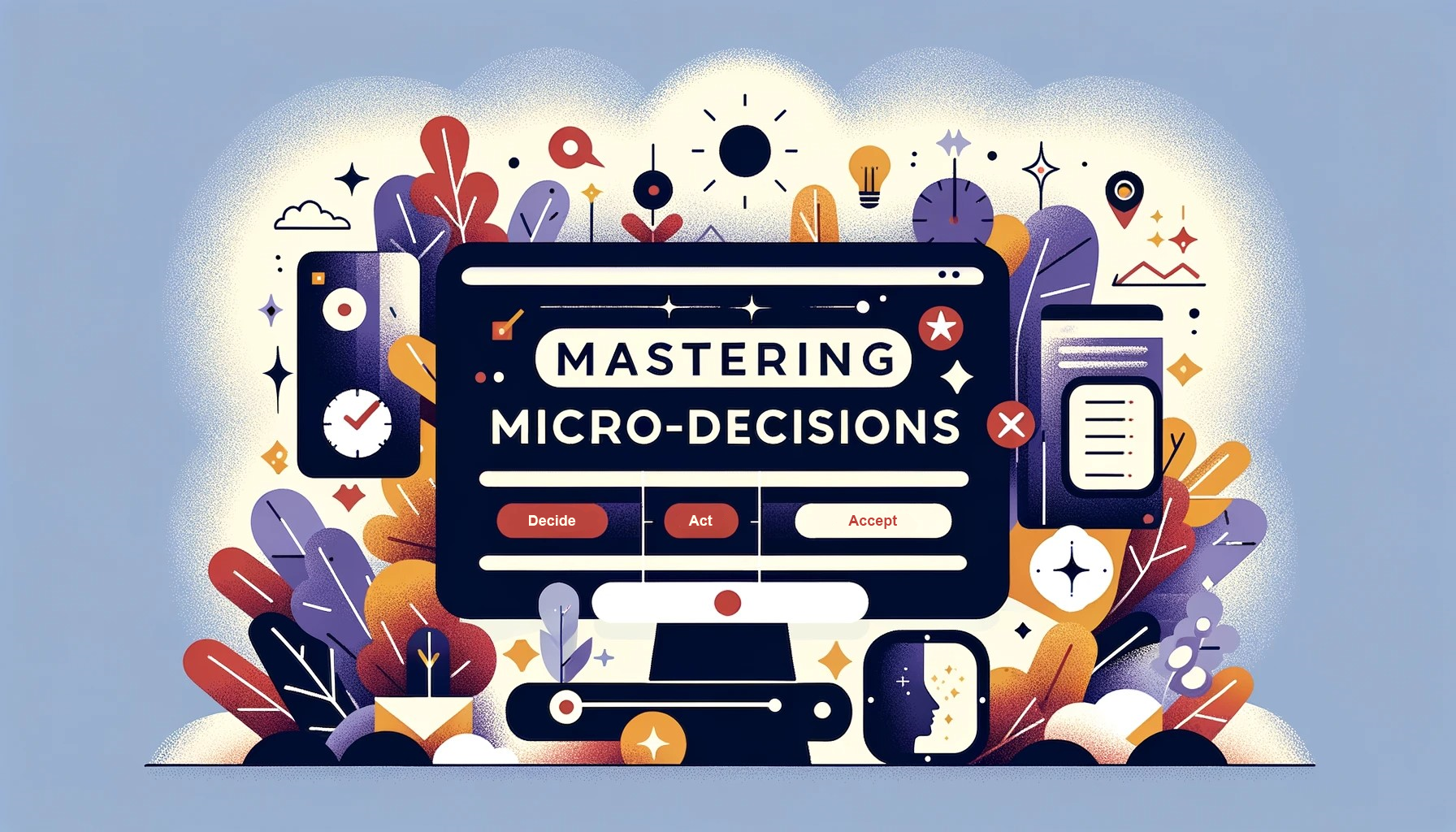We're part of the Varolio Inc. family.
©Varolio 2026. All rights reserved.
We're part of the Varolio Inc. family.
©Varolio 2026. All rights reserved.
Dive into the subtle art of micro-decisions in our latest article. Discover how these small choices shape our day-to-day productivity and success, and how with the right mentality and tools, you can make your days much more productive and enjoyable.



Every day, we navigate a sea of choices in our professional (and personal) lives. These aren't the big, life-changing decisions, but rather the myriad of small, seemingly insignificant ones – the micro-decisions. They might seem trivial, but these tiny choices add up, influencing our productivity and flow state in profound ways. Let's try to understand and unveil the complexity of micro-decisions.
Micro-decisions are the small choices we make almost unconsciously throughout our workday. Like choosing which email to open first or deciding whether to complete a task now or later. While each decision seems minor, collectively, they steer the ship of our daily productivity. It's like a game of dominoes; one small move sets the course for the next.
Some examples of common micro-decisions:
Choosing whether to start your day with email checking or diving straight into a major project.
Deciding whether you should email or call that new, exciting lead.
Opting to respond immediately to a new message or setting it aside for later.
Deciding which GPT conversation you should use for your current task.
The fourth example happened to me today. I wanted help with my code, and had about 4 slightly different, yet relevant GPT conversations I could use.
The need to decide had pulled me out of my flow, and made me slow down dramatically in the middle of my work day.
Imagine a day filled with a barrage of minor decisions – this is where the true cost of micro-decisions comes to light, and that is something we all experience regularly. Even one decision could throw you off, and when decision fatigue begins to set in; the snowball is real.
The main thing that could help is embracing a proactive, action-favored approach. Meaning, we should prioritize taking actions above all else, and accept that some minor decisions may not go our way. It's a trade off that we, as busy professionals, must accept.
Recognizing the Weight of Decisions: Understand that most micro-decisions carry minimal weight in the grand scheme of things. The key is to act rather than getting paralyzed by overthinking. Remember, not making a decision is often the worst choice.
Setting Decision Timelines: Implement a strategy to set specific times for making decisions or completing straightforward tasks. For example, allocate only 5 minutes to respond to each message. This approach prevents decision fatigue and keeps your day structured.
Trusting Your Intuition with 'Association': Play a quick game of 'association' with each decision. Go with your first gut feeling or intuition. This method is particularly effective for decisions that aren't critical but need a quick resolution, and for which you might be ambivalent regarding the best course of action.
Fostering a Supportive Environment: Create a work culture and circles where decisiveness is encouraged and supported. Encourage team members to act and make decisions, offering support and guidance when needed. You can also use small "punishments" and "rewards" system to keep you on track: If you take more than several minutes to decide on something - your colleague gets you a soda at lunch! On the other hand, they buy you a snack if you went an entire day and stuck to your plans.
The key is to understand that we're usually not handling such important matters. It's humbling, but realizing that most of our decisions have little to no meaning in the grand scheme of things, can help you get more done, and be less anxious about every little step you take.
In the spirit of proactive action, embracing AI and technological tools as our partners in decision-making is very helpful. AI-powered email filters, smart scheduling apps, and task management tools are like digital sidekicks, taking over routine decisions so we can zero in on more significant tasks.
Think of them as your personal assistant, intuitively understanding your needs, often before you even recognize them yourself. Again, they might fail you sometimes; you may not get the response you wanted. However, if 98% of the time, they save you an hour a day responding to messages, summarizing, and creating content for you - the 2% should be seen as a drop in the bucket. This is a price worth paying for releasing you from the need to make so many small decisions.
Ultimately, mastering micro-decisions isn't just about making choices; it's about embracing a mindset of decisive action. By recognizing that most decisions have minimal long-term impact, and leveraging both mental strategies and tech tools, we steer our ship towards more productive waters. It's a journey of taking many small, deliberate steps that collectively lead to substantial gains in productivity.
In the grand scheme of our work lives, it's these small, decisive actions that can lead to the most significant waves of success. Prioritizing activity, and increasing the number of actions and decisions you make, even if not perfect, will absolutely help you reach your goals faster, and be more content with the road you travel.